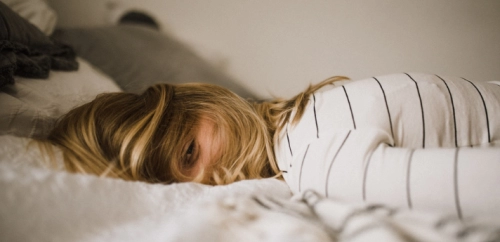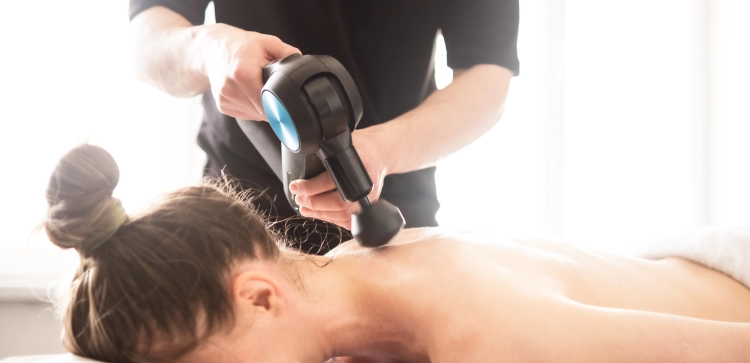Everything You Need To Know About Sleep Deprivation

We have all gone through nights where we spent endlessly turning over thoughts in our minds while our bodies are unable to relax enough to fall deep into sleep. Typically, the next day is not a great day for anyone who goes through this, as they tend to be very tired and irritable. This, however, is just an easy to fix situation. But when it is a consistent issue, then one has to start worrying about sleep deprivation.
Sleep deprivation happens when an individual consistently does not get the appropriate amount of sleep. For most, this tends to range between seven and nine hours a night. Suffering from sleep deprivation can bring with it cognitive problems, and mood swings, and even reduce the efficiency of your immune system so that you are more prone to illness.
This is a serious problem and one that many people suffer from thanks to stress and anxiety. It can have a great impact on your overall health - mental, emotional, and physical. To be able to spot it and combat it, you have to be very well versed in the problem. So in this guide, we're going to take a look at everything you need to know about sleep deprivation and why it happens.
Sleep Deprivation – Why Does It Happen?
Sleep deprivation is a condition that occurs when an individual, over a continuous amount of days, does not receive the proper amount of sleep. Though the proper amount of sleep varies from person to person, on average, adults tend to need between seven and nine hours every night.
When an adult doesn't get this amount of sleep, and it happens throughout those continuous nights, it can lead to a lot of problems. Not only will the individual suffer from cognitive issues like lack of memory and focus, but they can also find themselves more prone to infections and illness, as well as wild mood swings.
To understand what sleep deprivation does to a body, let's look at some of the causes first, and then we'll take a look at the symptoms that you can look for. Here are some of the causes that could be contributing to your sleep issues:
-
Disorders – One of the main causes of sleep deprivation is dealing with a sleep disorder like sleep apnea, insomnia, or restless leg syndrome.
-
Age - A lot of things in our lives change as we get older, and one of those might be issues with sleeping. For many individuals that are over 65, they experience increased trouble with getting to sleep. Not only does this have to do with age, but it can be due to certain health conditions as well as medication that they are taking.
-
Health Issues - Some illnesses can bring on sleep deprivation. This is especially true when dealing with mental illnesses like depression and schizophrenia. But these mental illnesses are not solely cornered in the mental realm, in fact chronic pain, cancer, and even other serious diseases can contribute to lack of sleep.
-
Miscellaneous - Like with any other issue, there are always extenuating factors that can't be pigeonholed into one category. Sleep deprivation can be caused by schedule changes, a disruption in your life and stress.
Symptoms to Look For…
So now that you have an idea of what may cause sleep deprivation, the question becomes how do you even know you have it? Truthfully, you may not know you have sleep deprivation until you realize there's something wrong and set up an appointment with a physician. There are however some symptoms that you can look for that might indicate you're suffering from this issue:
Hunger
When you lay your head down for the evening, it's time for your body to reboot itself. In other words, your brain takes this time to refresh itself and build up energy for the next day. But when you aren't getting that sleep, your brain still needs the energy and to compensate, it may trigger the areas of the brain that deal with hunger.
In order to do this, it may release ghrelin which is the hunger hormone, and when your body is flooded with this, it then looks to sugary and fatty foods because those are the things that are going to give the most energy. Along with this, the body may produce less leptin, which is the hormone that makes you feel full. Because there is less of this, you may have issues cutting yourself off.
Weight Gain
Since your body is not getting all the energy it needs, as we said above, you may find yourself more hungry. Because of this, you may see an increase in your weight. Just like with hunger, this is partially due to the hormones utilized in the hunger/satiation mode. Therefore, sleep deprivation is definitely tied to weight gain and even has an effect on metabolism, which tends to slow down when there isn't enough sleep.
Issues with Motor Skills
Every now and then our motor skills don't function properly, and we wind up tripping or dropping something. But when you see this happen continually multiple times during the day, you might be struggling with sleep deprivation. Several studies show that even with acute sleep deprivation, motor skills are impacted.
Cognitive Problems
Cognitive functions like memory and focus can be impacted by a lack of sleep. When your brain doesn't have the chance to shut down and reboot itself every night, several systems within it begin to falter, and one of those is protein synthesis.
This happens in the hippocampus area of the brain, and it is directly correlated with learning and memory. On top of this, sleep deprivation may cause oxidative stress, and that in turn can also hinder your memory and other cognitive functions.
Mood Swings
If you're suffering from sleep deprivation, you might notice that you feel out of control emotionally. You may overreact or suddenly break out in tears. Your emotions may be all over the place, from high anxiety to anger and back again in several moments.
This is once again because your brain is not being allowed the time to recharge itself and therefore may act by releasing certain hormones which triggers systems in your body like the fight or flight more easily.
Sickness
Your brain plays a pivotal part in every aspect of your body's functioning. One of the systems that sleep deprivation impacts the most is your immune system. Not having enough sleep will prevent your body from producing the things it needs to fight off infections and viruses.
As you're sleeping, your body will produce something called cytokines. This is a protein that is directly correlated with protection against inflammation and infections.
Being able to notice the signs doesn't necessarily mean that that's what you're dealing with. So when you spot these signs, you might want to reach out to a doctor to see if they can set you up with a sleep specialist. There could be something more serious going on, and it's always best to check with a dedicated professional.
That being said, when or if you actually visit a sleep professional, you might find that they diagnose you with one of three different types of sleep deprivation:
-
Acute - Acute sleep deprivation is one that usually is diagnosed when it's just a few days or more that the individual suffered from it.
-
Chronic - Another term for this is called insufficient sleep syndrome. Medical professionals define this as a reduction in sleep that goes on for longer than three months.
-
Deficiency - This is by far the most serious as it is an ongoing condition. Not only does one suffer from a lack of sleep but a lack of good sleep and this could cause several major health issues.
Effects Of Sleep Deprivation
It seems to us that now you have a good grasp of the causes and symptoms of sleep deprivation. But to understand how important it is, you have to understand the effects of sleep deprivation on your body.
So we've taken a deep dive into each of the major systems of the body to show you what happens to them and in them when you're suffering from sleep deprivation.
Nervous System
The human central nervous system is how all the information gets from one part of your body to your brain. In order to keep this system working properly, the human body needs sleep. That means that sleep deprivation can affect every process within your body very easily.
While our body shuts down during sleep, new nerve cells and pathways are created to log information. When dealing with sleep deprivation, our brains don't have the time to do that and therefore the information is not stored. These new neural pathways not being formed may lead to a lack of cognitive skills like information retention and focus.
Other factors that may come along with sleep deprivation in regard to the central nervous system are issues with emotional and mental states and in severe cases, one may even deal with hallucinations. For those with a bipolar mood disorder, it can also trigger a manic episode.
Immune System
Another vital system is our immune system. This is the system that our bodies uses to fight off viruses and inflammations to keep us healthy. When sleeping, the body creates antibodies and cytokines that are specifically designed to fight these issues.
On top of that, the cytokines can also help with sleep as it helps defend against other illnesses that could potentially affect the sleep cycle. If one is suffering from sleep deprivation, it keeps the immune system in a stalemate and therefore doesn't allow it to do its job.
This leaves the body susceptible to those viruses and bacteria that can cause illnesses. On top of that, because of the lack of antibodies and cytokines created, it is harder to recover from any illness that one contracts. If one suffers from chronic sleep deprivation, it can also lead to some pretty serious conditions like heart disease and diabetes.
Respiratory System
The respiratory system is one of those systems that actually have an effect on your sleep and can be affected by sleep deprivation. If someone suffers from something like sleep apnea, which is a breathing disorder, it could very well be the cause of the sleep deprivation.
That said, sleep deprivation can also exacerbate already existing problems with an ill-performing respiratory system. Making these diseases like any type of lung illness or even a simple cold worse because of the lack of sleep.
Digestive System
Sleep deprivation is going to cause most people to be hungry, and the lack of energy will reduce the chance of them getting out and exercising. This means that sleep deprivation brings with it weight gain and the potentiality for winding up with issues having to do with obesity. This is because sleep, as we said above, is when leptin and ghrelin are produced.
The increase of ghrelin and the reduction of leptin produced in the body coupled with the lack of energy is the combination necessary for an individual to deal with excessive weight gain. When dealing with sleep deprivation, the body also produces less insulin, which will cause a blood sugar spike.
That, coupled with the fact that when your body is not allowed to have that shutdown, its tolerance for glucose and insulin resistance is lowered. This is why sleep deprivation can lead to obesity as well as diabetes.
Cardiovascular System
Sleep is probably the most important health tool, not only does it affect all the previous systems we talked about, but it also has to do with your heart health and cardiovascular system. During the shutdown process of sleep, the body begins repairing the heart and blood vessels as well.
It is at this time that the blood vessels having to do with things like blood pressure and inflammation levels are all taken care of. Because of the importance of sleep in this system, when one suffers from sleep deprivation, it is more likely for them to have to deal with cardiovascular disease and other heart health-related issues.
Endocrine System
Sleep and hormone production are a symbiotic relationship. Everything from testosterone to growth hormones are affected by a lack of sleep. Our bodies have to reach a certain point of the sleep cycle to begin producing these hormones.
When our bodies are not reaching that, these hormones lack and that can cause a lot of health issues. Interruption of any of these hormone productions like cytokinea has a serious impact on a wide range of systems.
Ways to Solve Sleep Deprivation
So now you can see why diagnosing sleep deprivation and treating it is so important when it comes to your overall health. On top of your physical, mental, and emotional, it can affect your spiritual as well. This is something we haven't mentioned, but a lack of sleep will cause blockages in your energy flow, which could lead to even more health problems along the road.
With that being said, let's take a look at some preventative measures and ways that sleep deprivation can be treated:
Preventative Measures
The best thing is to not have to deal with sleep deprivation at all. To do this, you need to ensure that you get anywhere between seven and nine hours of sleep every night. This has to be good sleep and consistent sleep, for sleep deprivation to not take hold.
There are many ways that you can ensure that you are taking steps to prevent it. Here are a few ideas:
-
Try not to take naps during the day.
-
Reduce caffeine consumption in the afternoon and especially close to bedtime.
-
Try to maintain a schedule of when you're waking up as well as when you're going to sleep.
-
Make sure that the meal that is eaten before bedtime is light.
-
Disconnect before your bedtime by a couple of hours. This means shedding your phone down and refraining from looking at any electronic devices.
-
Incorporate exercise regularly during your days, but not too close to bedtime.
-
Refrain from as much alcohol consumption as possible.
-
Dim the lights in your house and bedroom 2 hours before sleep to imitate the natural light/dark cycle outside
Treatments
If even after all those preventive measures are done, you still find yourself suffering from sleep deprivation, you may need to seek help from a physician or sleep specialist. Sleep deprivation can also affect the quality of sleep that you are getting every night. So the doctor or specialist may look to perform a sleep study on you.
Typically, this happens at a sleep center, where they monitor your sleep cycles during the process. Once it's been deduced that you are suffering from sleep deprivation, the doctor then can look at ways to treat it. These ways may include medication or even devices that help you get more air into your body, depending on what is the cause of the sleep deprivation.
Final Thoughts
Sleep deprivation comes when you are unable to achieve the right amount of sleep (typically 7 to 9 hours a night). Our bodies require sleep to allow for systems to reboot and heal themselves from the rigors of the previous day. Without this, many of our systems may begin functioning poorly and this could lead to serious health concerns. Addressing the issues quickly can ensure that you stay happy and healthy and well rested.
















